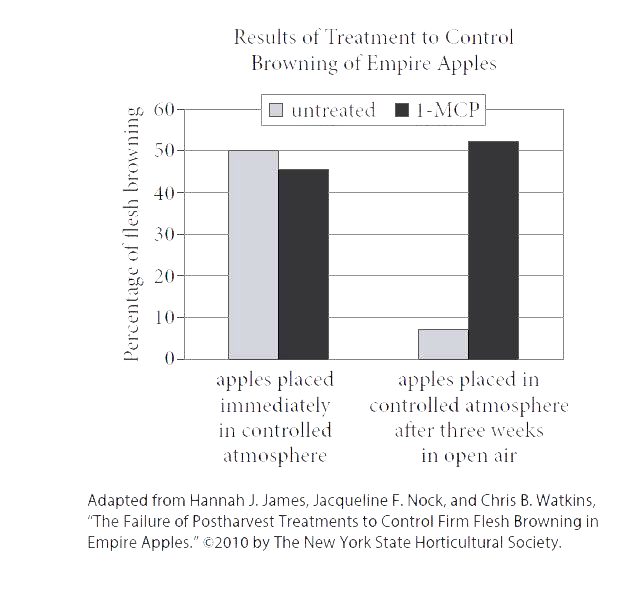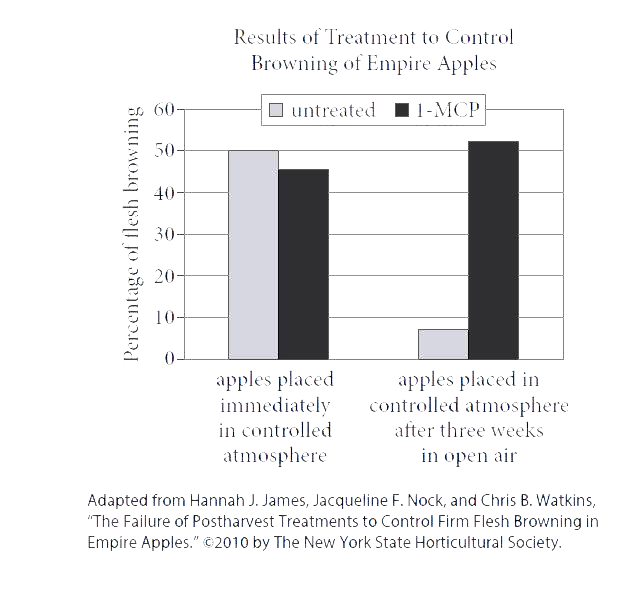Assertion : The most widely used compound as source of ethylene is ethephon.
Reason : Ethephon hastens fruit ripening in tomatoes and apples and accelerates abscission in stems and leaves.
If both assertion and reason are true and reason is the correct explanation of assertion
If both assertion and reason are true but reason is not the correct explanation of assertion
If assertion is true but reason is false
If both assertion and reason are false
The correct Answer is:c
To solve the question, we need to analyze the assertion and the reason provided:
Step 1: Analyze the Assertion
The assertion states: "The most widely used compound as a source of ethylene is ethephon."
- Ethylene is a plant hormone that plays a crucial role in the ripening of fruits and other developmental processes.
- Ethephon is indeed a widely used compound that releases ethylene when it decomposes. Therefore, this assertion is true.
Step 2: Analyze the Reason
The reason states: "Ethephon hastens fruit ripening in tomatoes and apples and accelerates abscission in stems and leaves."
- It is correct that ethephon is used to hasten the ripening of fruits such as tomatoes and apples.
- However, the statement about accelerating abscission (the process where leaves, flowers, or fruits detach from the plant) is partially misleading. Ethephon primarily promotes abscission in flowers and fruits rather than in stems and leaves.
- Therefore, while the first part of the reason is true, the second part is misleading, making the reason false.
Conclusion
- The assertion is true, and the reason is false. Therefore, the correct answer is that the assertion is true, but the reason is false.
Final Answer
Assertion is true, Reason is false.
---
The assertion states: "The most widely used compound as a source of ethylene is ethephon."
- Ethylene is a plant hormone that plays a crucial role in the ripening of fruits and other developmental processes.
- Ethephon is indeed a widely used compound that releases ethylene when it decomposes. Therefore, this assertion is true.
The reason states: "Ethephon hastens fruit ripening in tomatoes and apples and accelerates abscission in stems and leaves."
- It is correct that ethephon is used to hasten the ripening of fruits such as tomatoes and apples.
- However, the statement about accelerating abscission (the process where leaves, flowers, or fruits detach from the plant) is partially misleading. Ethephon primarily promotes abscission in flowers and fruits rather than in stems and leaves.
- Therefore, while the first part of the reason is true, the second part is misleading, making the reason false.
- The assertion is true, and the reason is false. Therefore, the correct answer is that the assertion is true, but the reason is false.
Assertion is true, Reason is false.
Topper's Solved these Questions
- PLANT GROWTH AND DEVELOPMENTBook:NCERT FINGERTPS ENGLISHChapter:PLANT GROWTH AND DEVELOPMENTExercise:Plant Growth And Development
Explore 154 Videos
- PLANT GROWTH AND DEVELOPMENTBook:NCERT FINGERTPS ENGLISHChapter:PLANT GROWTH AND DEVELOPMENTExercise:Examplar problems
Explore 12 Videos
- PHOTOSYNTHESIS IN HIGHER PLANTSBook:NCERT FINGERTPS ENGLISHChapter:PHOTOSYNTHESIS IN HIGHER PLANTSExercise:Photosynthesis In Higher Plants
Explore 136 Videos
- PLANT KINGDOMBook:NCERT FINGERTPS ENGLISHChapter:PLANT KINGDOMExercise:Plant Kingdom
Explore 160 Videos
Similar Questions
Knowledge Check
The most widely used compound as a source of C2H4 is
AKinetinBzeatinCIBADethephonAssertion : Auxins help to prevent fruits and leaves droo at early stages.
Reason : Auxins promote the abscission of older mature leaves and fruits.AIf both assertion and reason are true and reason is the correct explanation of assertionBIf both assertion and reason are true but reason is not the correct explanation of assertionCIf assertion is true but reason is falseDIf both assertion and reason are falseHow Do You Like Those Apples? Marketed as SmartFresh, the chemical 1-MCP (1-methylcyclopropene) has been used by fruit growers since 2002 in the United States and elsewhere to preserve the crispness and lengthen the storage life of apples and other fruit, which often must travel long distances before being eaten by consumers. 23 1-MCP lengthens storage life by three to four times when applied to apples. This extended life allows producers to sell their apples in the off-season, months after the apples have been harvested. And at a cost of about one cent per pound of apples, 1-MCP is a highly cost-effective treatment. However, 1-MCP is not a panacea for fruit producers or sellers: there are problems and limitations associated with its use.[1] 1-MCP works by limiting a fruit’s production of ethylene, 24 it is a chemical that causes fruit to ripen and eventually rot. [2] While 1-MCP keeps apples 25 tight and crisp for months, it also limits 26 their scent production. [3] This may not be much of a problem with certain kinds of apples that are not naturally very fragrant, such as Granny Smith, but for apples that are prized for their fruity fragrance, such as McIntosh, this can be a problem with onsumers, 27 that will reject apples lacking the expected aroma. [4] But some fruits do not respond as well to 1-MCP as others 28 did, and some even respond adversely. [5] Furthermore, some fruits, particularly those that naturally produce a large amount of ethylene, do not respond as well to 1-MCP treatment. [6] Take Bartlett 29 pears, for instance, unless they are treated with exactly the right amount of 1-MCP at exactly the right time, they will remain hard and green until they rot, and consumers who experience this will be unlikely to purchase them again. 30 Finally, researchers have found that 1-MCP actually increases susceptibility to some pathologies in certain apple varieties. For example, Empire apples are prone to a condition that causes the flesh of the apple to turn brown. Traditionally, apple producers have dealt with this problem by leaving the apples in the open air for three weeks before storing them in a controlled atmosphere with tightly regulated temperature, humidity, and carbon dioxide levels. As the graph shows, the flesh of untreated Empire apples that are first stored in the open air undergoes 31 roughly five percent less browning than the flesh of untreated Empire apples that are immediately put into storage in a controlled environment. However, when Empire apples are treated with 1-MCP, 32 their flesh turns brown when the apples are first stored in the open air, though not under other conditions. Although researchers continue to search for the right combination of factors that will keep fruits fresh and attractive, 33 the problem may be that consumers are overly concerned with superficial qualities rather than the actual freshness of the fruit.

Which choice most effectively combines the underlined sentences?AWhen applied to apples, 1-MCP lengthens storage life by three to four times, allowing producers to sell their apples in the off-season, months after the apples have been harvested.BProducers are allowed to sell their apples months after they have been harvested—in the off-season—because 1-MCP, when applied to apples, lengthens their storage life by three to four timesC1-MCP lengthens storage life, when applied to apples, by three to four times, allowing producers to sell their apples months after the apples have been harvested in the off-season.DMonths after apples have been harvested, producers are allowed to sell their apples, in the off-season, because 1-MCP lengthens storage life when applied to apples by three to four times.
Which one of the followings plants is monoecious?
View SolutionAssertion : 2, 4-D is widely used by farmers in agricultural and horticultural practices.
Reason : Flowering in most plants can be intiated by using high concerntration of auxin.
View SolutionAssertion :- Main function of stem is spreading out branches bearing leaves, flowers and fruits.
Reason :- Usually monocot stem is differentiated into nodes and internodes.
View SolutionEthylene is used for
(a)retarding ripening of tomatoes
(b)hastening of ripening of fruits
(c )slowing down ripening of apples
(d)Both b and c
View SolutionHow Do You Like Those Apples? Marketed as SmartFresh, the chemical 1-MCP (1-methylcyclopropene) has been used by fruit growers since 2002 in the United States and elsewhere to preserve the crispness and lengthen the storage life of apples and other fruit, which often must travel long distances before being eaten by consumers. 23 1-MCP lengthens storage life by three to four times when applied to apples. This extended life allows producers to sell their apples in the off-season, months after the apples have been harvested. And at a cost of about one cent per pound of apples, 1-MCP is a highly cost-effective treatment. However, 1-MCP is not a panacea for fruit producers or sellers: there are problems and limitations associated with its use.[1] 1-MCP works by limiting a fruit’s production of ethylene, 24 it is a chemical that causes fruit to ripen and eventually rot. [2] While 1-MCP keeps apples 25 tight and crisp for months, it also limits 26 their scent production. [3] This may not be much of a problem with certain kinds of apples that are not naturally very fragrant, such as Granny Smith, but for apples that are prized for their fruity fragrance, such as McIntosh, this can be a problem with consumers, 27 that will reject apples lacking the expected aroma. [4] But some fruits do not respond as well to 1-MCP as others 28 did, and some even respond adversely. [5] Furthermore, some fruits, particularly those that naturally produce a large amount of ethylene, do not respond as well to 1-MCP treatment. [6] Take Bartlett 29 pears, for instance, unless they are treated with exactly the right amount of 1-MCP at exactly the right time, they will remain hard and green until they rot, and consumers who experience this will be unlikely to purchase them again. 30 Finally, researchers have found that 1-MCP actually increases susceptibility to some pathologies in certain apple varieties. For example, Empire apples are prone to a condition that causes the flesh of the apple to turn brown. Traditionally, apple producers have dealt with this problem by leaving the apples in the open air for three weeks before storing them in a controlled atmosphere with tightly regulated temperature, humidity, and carbon dioxide levels. As the graph shows, the flesh of untreated Empire apples that are first stored in the open air undergoes 31 roughly five percent less browning than the flesh of untreated Empire apples that are immediately put into storage in a controlled environment. However, when Empire apples are treated with 1-MCP, 32 their flesh turns brown when the apples are first stored in the open air, though not under other conditions. Although researchers continue to search for the right combination of factors that will keep fruits fresh and attractive, 33 the problem may be that consumers are overly concerned with superficial qualities rather than the actual freshness of the fruit.

View Solution